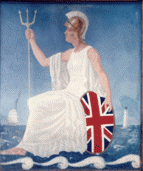 Last year, Bede and I reviewed some compelling British history docu-dramas like Blackadder and Manor House. We decided to cull our knowledge for the benefit of an unsuspecting (but no doubt grateful) American public. Bede published it on his blog, but that file mysteriously disappeared. Now, it has resurfaced. Here, then, is our version of...
Last year, Bede and I reviewed some compelling British history docu-dramas like Blackadder and Manor House. We decided to cull our knowledge for the benefit of an unsuspecting (but no doubt grateful) American public. Bede published it on his blog, but that file mysteriously disappeared. Now, it has resurfaced. Here, then, is our version of...• Beowulf: The first English king of any note. He was a great monster hunter, a trick later copied to great effect by St. George, who wasn't a king.
• King Lear: Lear is commonly believed to have been the second king of England, but scholars and educated folk know that, like most Shakespearian kings, he was actually king of Scotland. He is included here for completeness. Was killed by Macbeth.
• King Arthur: After Beowulf died, no one could decide who should be king, so they had to wait around for 10 years until Beowulf's second cousin, Arthur, pulled the sword from the stone and went on to rule England. King Arthur had two sons, Richard and John.
• King Richard the Lionhearted: Popularly believed to have invented the Crusades, Richard actually stole the idea from a hermit named Geoffrey Chaucer. Richard's surly brother, John, ruled the realm while Richard was away fighting five Crusades, but eventually Richard came back, fired John, and gave his job to Robin Hood. King Richard had eight sons, all named Henry, who ruled the realm, each in turn, for the next century or so. None of them did anything much, except for Henry V (no one knows what the V stands for), who was a famous Shakespearian actor.
• Henry the Eighth: Had eight wives, all of whom he beheaded. Died poorly.
• Queen Mary: Being out of kings, England was forced to resort to the crowning of queens. Mary's short reign is noted for the invention of the cocktail.
• Queen Elizabeth I: QE is famous for renaming the kingdom as an Empire.
• At this point, England had no kings or queens left, and so was forced to import one from Germany, which had a surplus. This ended poorly when King George III went mad and gave America away to the Americans.
• Reggie: Reggie, who gave his name to the Regency era, wasn't a king, but rather a Regent. He was later replaced by his Butler, Edmund Blackadder, who went on to be one of the greatest monarchs England ever had. During this time, Edward de Vere, the 17th Earl of Oxford, wrote novels under the nom de plume of
"Georgette Heyer," hence the famous "Regency" romances that were so popular.
• Queen Victoria: Changed her name to Victoria because she was born in the Victorian age.
• Edward VII: King known best for guest appearance on Upstairs Downstairs. Ruled until WWI.
• Winston Churchill: Churchill took the reins of power in order to guide the nation through WWII. He wasn't, strictly speaking, a king, which is why this period is sometimes called the Interregnum.
• Elizabeth II: Best known for inventing the pound note, which bears her likeness to this day.
Hurrah for Britannia!
Respectfully submitted by Alkelda and Bede, circa March 2004. We strongly recommend you consult less colorful but more reputable sources for your homework assignments. That's our disclaimer, and we're sticking to it. We periodically check this post for broken links, but if you notice any broken links first, please tell me.





4 comments:
This is absolutely hilarious!
-- Sir Reggie
Thank you, Sir Reggie.
I have had the occassion to read a Georgette Heyer novel (if I may loosely call it that). Wonderfully historically accurate and full of very saucy sex scenes. Oh that Edward de Vere!
Sign me--
A Fan of Promiscuity in Type
Dear Fan of Promiscuity in Type,
You may indeed call Georgette Heyer's books "novels"-- if I recall rightly, they were shelved in the regular grown-up fiction section, and not in the romance section. Were there saucy sex scenes? I don't remember any of them! My favorite book of Heyer's was The Grand Sophy. Sophy was tall and clever, and had a parrot for a pet.
Post a Comment